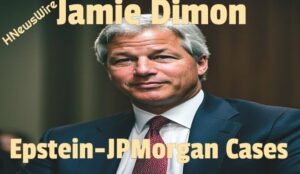
BanksterCrime
By Pam Martens and Russ Martens:
Both Bloomberg News and the Wall Street Journal have now reported that it’s not just presidential candidate Donald Trump that is proposing a U.S. Sovereign Wealth Fund, but that President Joe Biden’s administration is also exploring the idea.
The Wall Street Journal reported as follows on the Biden plan late Sunday night:
“It isn’t clear how far the White House plan, overseen by national security adviser Jake Sullivan and his deputy Daleep Singh, is from completion, or whether Vice President Kamala Harris, the Democratic presidential candidate, supports it. A Harris spokesman didn’t respond to a request for comment.”
The advisor on Trump’s plan for a U.S. Sovereign Wealth Fund is John Paulson – a hedge fund billionaire not particularly known for putting the national security interests of America ahead of his own greed. (See our reporting yesterday for background on Paulson’s shorting of the U.S. housing market, becoming a billionaire as millions of families lost their homes to foreclosure in the worst financial crisis since the Great Depression.)
The advisor on Biden’s plan – as reported by both the Wall Street Journal and Bloomberg News – is the National Security Advisor Jake Sullivan. For the National Security Advisor to be investigating putting more government money into businesses engaged in critical national security areas, means there are very serious problems that market forces on Wall Street are failing to address. Investors on Wall Street want to see ongoing proof of profits, rather than engage in patient long-term investing to ensure the national security of the United States.
Three such problems come to mind immediately: Intel, Boeing and U.S. Steel.
As the chart above indicates, in less than nine months, Intel has lost 60 percent of its market value; Boeing has lost almost 40 percent; and U.S. Steel has lost over 30 percent. All three companies play key roles in U.S. national security.
Let’s start with Intel. It was just six months ago that President Biden announced that “the Department of Commerce has reached a preliminary agreement with Intel to provide up to $8.5 billion in direct funding along with $11 billion in loans under the CHIPS and Science Act. The announcement will support the construction and expansion of Intel facilities in Arizona, Ohio, New Mexico, and Oregon, creating nearly 30,000 jobs and supporting tens of thousands of indirect jobs.”
The support to Intel wasn’t just to create jobs. The White House statement explained that “Semiconductors were invented in America and power everything from cell phones to electric vehicles, refrigerators, satellites, defense systems, and more. But today, the United States produces less than 10 percent of the world’s chips and none of the most advanced ones.” Biden said his goal was to “produce roughly 20 percent of the world’s leading-edge chips by the end of this decade.”
Now Intel’s future is looking wobbly with Moody’s downgrading its debt on August 8 and its share price in freefall.
Then there is Boeing – which seems to be hellbent on sabotaging its once great reputation. CNN Senior Business Reporter Chris Isidore summed up Boeing’s problems like this eight days ago, while reporting that 32,000 workers at Boeing may go on strike later this month:
“It’s just the latest in a series of serious and high-profile problems at a company that has dealt with fatal crashes traced to a design flaw in its best-selling jet, accusations that it put profits and production speed ahead of quality and safety, tanking aircraft sales, an agreement to plead guilty to criminal charges that it deceived regulators, and massive financial losses covered by soaring levels of debt.”
Boeing’s website trumpets its contribution to U.S. national security, writing that “Defense, Space & Security is one of The Boeing Company’s three business units. One of the world’s largest defense and space contractors, BDS is a global leader in the development, production, maintenance and enhancement of fixed-wing and rotary wing aircraft, commercial and government satellites, human spaceflight programs and weapons….”
And then there is U.S. Steel, which received a buyout offer from the Japanese company, Nippon Steel, in December of 2023. U. S. Steel stockholders approved the buyout on April 12, 2024. Consummation of the deal has been awaiting review by the U.S. Committee on Foreign Investment in the United States (CFIUS). Reuters is reporting this morning that it has seen a letter from CFIUS which characterizes the deal as doing damage to American steel production, among other things. The Reuters’ report follows recent headlines that both presidential candidates, Kamala Harris and Donald Trump, are opposed to the buyout.
As far back as March, President Biden has spoken out against a foreign takeover of U.S. Steel, stating on March 14 that “U.S. Steel has been an iconic American steel company for more than a century, and it is vital for it to remain an American steel company that is domestically owned and operated.”
It is highly likely that there is a lot more than just the future of these three companies that has the National Security Advisor looking for a method to shore up capital, share prices, and survivability of national security interests, given Wall Street’s (and hedge fund guys like Paulson’s) propensity to make bets against (short) anything that looks vulnerable.

![]()



